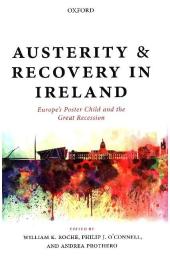 Neuerscheinungen 2016Stand: 2020-02-01 |
Schnellsuche
ISBN/Stichwort/Autor
|
Herderstraße 10
10625 Berlin
Tel.: 030 315 714 16
Fax 030 315 714 14
info@buchspektrum.de |

Andrea Prothero, William K. Roche
(Beteiligte)
Austerity and Recovery in Ireland
Europe´s Poster Child and the Great Recession
Herausgegeben von Roche, William K.; Prothero, Andrea
2016. 368 p. 62 Figures, 36 Tables. 242 mm
Verlag/Jahr: OXFORD UNIVERSITY PRESS; OUP OXFORD 2016
ISBN: 0-19-879237-9 (0198792379)
Neue ISBN: 978-0-19-879237-6 (9780198792376)
Preis und Lieferzeit: Bitte klicken
This book presents a systematic analysis of the Great Recession, austerity, and subsequent recovery in Ireland. It discusses the extent to which the Irish response to the recession led to significant changes in economic policy and in business, work, consumption, the labour market, and society.
In international commentary and debate on the effects of the Great Recession and austerity, Ireland has been hailed as the poster child for economic recovery and regeneration out of deep economic and fiscal contraction. While the genesis of Ireland´s financial, economic and fiscal crisis has been covered in the literature, no systematic analysis has yet been devoted to the period of austerity, to the impact of austerity on institutions and people, or to the roots of
economic recovery.
In this book a group of Ireland´s leading social scientists present a multi-disciplinary analysis of recession and austerity and their effects on economic, business, political and social life. Individual chapters discuss the fiscal and economic policies implemented, the role of international, and, in particular, of EU institutions, and the effects on businesses, consumption, work, the labour market, migration, political and financial institutions, social inequality and cohesion, housing and
cultural expression.
The book shows that Ireland cannot be viewed uncritically as a poster child for austerity. While fiscal contraction provided a basis for stabilizing the perilous finances of the State, economic recovery was due in the main to the long-established structure of Irish economic and business activity, to the importance of foreign direct investment and the dynamic export sector, and to recovery in the international economy. The restructuring and recovery of the financial system was aided by
favourable international developments, including historically low interest rates and quantitative easing. Migration flows, nominal wage stability, the protection of social transfer payments and the involvement of trade unions in severe public sector retrenchment - long-established features of Irish political
economy - were of critical importance in the maintenance of social cohesion.
The many strands of ruin and gradual but not complete recovery are dealt with in a style that is both scholarly and accessible. This richness makes it the best overall single-volume assessment of our recent political and social experience. Paschal Donohoe, Minister for Public Expenditure and Reform, The Irish Times


